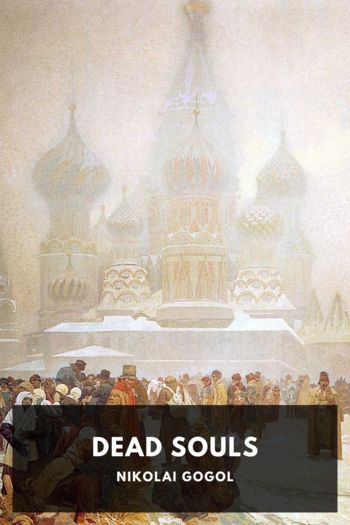Short Fiction - Nikolai Gogol (best selling autobiographies TXT) 📗

- Author: Nikolai Gogol
Book online «Short Fiction - Nikolai Gogol (best selling autobiographies TXT) 📗». Author Nikolai Gogol
“3. The above-described nobleman, whose very name and surname inspire thorough disgust, cherishes in his mind a malicious design to burn me in my own house. Which the infallible signs, hereinafter mentioned, fully demonstrate; in the first place, the said wicked nobleman has begun to emerge frequently from his apartments, which he never did formerly on account of his laziness and the disgusting corpulence of his body; in the second place, in his servants’ apartments, adjoining the fence, surrounding my own land, received by me from my father of blessed memory, Ivan Pererépenko, son of Onisieff, a light burns every day, and for a remarkably long period of time, which is also a clear proof of the fact. For hitherto, owing to his repulsive niggardliness, not only the tallow-candle but also the grease-lamp has been extinguished.
“And therefore I pray that the said nobleman, Ivan Dovgotchkun, son of Nikifor, being plainly guilty of incendiarism, of insult to my rank, name, and family, and of illegal appropriation of my property, and, worse than all else, of malicious and deliberate addition to my surname, of the nickname of goose, be condemned by the court, to fine, satisfaction, costs, and damages, and, being chained, be removed to the town jail, and that judgment be rendered upon this, my plaint, immediately and without delay.
“Written and composed by Ivan Pererépenko, son of Ivan, nobleman, and landed proprietor of Mirgorod.”
After the reading of the plaint was concluded, the judge approached Ivanovitch, took him by the button, and began to talk to him after this fashion: “What are you doing, Ivan Ivanovitch? Fear God! throw away that plaint, let it go! may Satan carry it off! Better take Ivan Nikiforovitch by the hand and kiss him, buy some Santurinski or Nikopolski liquor, make a punch, and call me in. We will drink it up together and forget all unpleasantness.”
“No, Demyan Demyanovitch! it’s not that sort of an affair,” said Ivan Ivanovitch, with the dignity which always became him so well; “it is not an affair which can be arranged by a friendly agreement. Farewell! Good day to you, too, gentlemen,” he continued with the same dignity, turning to them all. “I hope that my plaint will lead to proper action being taken;” and out he went, leaving all present in a state of stupefaction.
The judge sat down without uttering a word; the secretary took a pinch of snuff; the clerks upset some broken fragments of bottles which served for inkstands; and the judge himself, in absence of mind, spread out a puddle of ink upon the table with his finger.
“What do you say to this, Dorofei Trofimovitch?” said the judge, turning to the assistant after a pause.
“I’ve nothing to say,” replied the clerk.
“What things do happen!” continued the judge. He had not finished saying this before the door creaked and the front half of Ivan Nikiforovitch presented itself in the courtroom; the rest of him remaining in the anteroom. The appearance of Ivan Nikiforovitch, and in court too, seemed so extraordinary that the judge screamed; the secretary stopped reading; one clerk, in his frieze imitation of a dress-coat, took his pen in his lips; and the other swallowed a fly. Even the constable on duty and the watchman, a discharged soldier who up to that moment had stood by the door scratching about his dirty tunic, with chevrons on its arm, dropped his jaw and trod on someone’s foot.
“What chance brings you here? How is your health, Ivan Nikiforovitch?”
But Ivan Nikiforovitch was neither dead nor alive; for he was stuck fast in the door, and could not take a step either forwards or backwards. In vain did the judge shout into the anteroom that someone there should push Ivan Nikiforovitch forward into the courtroom. In the anteroom there was only one old woman with a petition, who, in spite of all the efforts of her bony hands, could accomplish nothing. Then one of the clerks, with thick lips, a thick nose, eyes which looked askance and intoxicated, broad shoulders, and ragged elbows, approached the front half of Ivan Nikiforovitch, crossed his hands for him as though he had been a child, and winked at the old soldier, who braced his knee against Ivan Nikiforovitch’s belly, so, in spite of the latter’s piteous moans, he was squeezed out into the anteroom. Then they pulled the bolts, and opened the other half of the door. Meanwhile the clerk and his assistant, breathing hard with their friendly exertions, exhaled such a strong odour that the courtroom seemed temporarily turned into a drinking-room.
“Are you hurt, Ivan Nikiforovitch? I will tell my mother to send you a decoction of brandy, with which you need but to rub your back and stomach and all your pains will disappear.”
But Ivan Nikiforovitch dropped into a chair, and could utter no word beyond prolonged oh’s. Finally, in a faint and barely audible voice from fatigue, he exclaimed, “Wouldn’t you like some?” and drawing his snuffbox from his pocket, added, “Help yourself, if you please.”
“Very glad to see you,” replied the judge; “but I cannot conceive what made you put yourself to so much trouble, and favour us with so unexpected an honour.”
“A plaint!” Ivan Nikiforovitch managed to ejaculate.
“A plaint? What plaint?”
“A complaint …”—here his asthma entailed a prolonged pause—“Oh! a complaint against that





Comments (0)